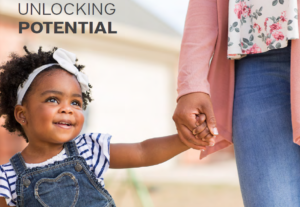By Cynthia Rice, Senior Policy Analyst, ACNJ and Meghan Tavormina, President, NJAEYC Co-Chairs, Think Babies Child Care Workgroup
It was no surprise when Governor Murphy deemed child care an “essential service” as part of his stay-at-home executive order in March. Parents working in hospitals, nursing homes, food and drug stores and gas stations could not have gone to work without a safe place for their children to be cared for and educated.
And the child care community rose to the occasion.
While public schools were required to close, approximately 500 of New Jersey’s 4,200 child care programs remained open to educate and care for children whose parents were needed to provide for our neighbors. These programs’ teachers and aides came to work every day, providing nurturing and caring experiences under new stringent standards that included social distancing, wearing face masks, frequent hand washing, cleaning and temperature checks. These increased standards—and increased work—was all meant to keep children and staff safe and healthy.
For many child care staff, however, one thing that didn’t change was their salaries. Even during a pandemic, when child care was deemed an essential service and staff were responsible for caring for young children, their wages continued to be low.
Many child care workers make less than cashiers and other entry-level jobs. In fact, most early childhood educators earn so little, they qualify for public benefits, including programs they work for because those programs target low-income families. And according to New Jersey’s 2018 Early Childhood Workforce Index, the median wage for a child care worker was $11.51, with 51 percent of these workers being eligible to participate in one or more public income support programs. Cynthia Soete, President of the Coalition for Infant Toddler Educators (CITE) shares the constant challenge of this reality. “Finding qualified staff has always been hard because of what we pay our early childhood care workforce. It will now be even harder because their responsibilities will increase in order for us to meet the new safety standards. We are asking so much from them professionally, for so little compensation.
The problem of child care’s continued low staff salaries became glaringly evident in recent months when child care directors reached out to their staffs to discuss reopening. Many directors got “pushback” from their staff because they were making significantly more money on unemployment than they would if they returned to work.
Some directors are finding that their staffs are also hesitant to return to work because of safety reasons. They fear that they are putting their own health and the health of their families at risk because they will be working with a population in which enforcing social distancing is an uphill battle.
Young children are not wired to stay six feet apart. They want to play together and hug each other and our staff, and that makes social distancing very difficult,” said Stephanie Anderson, Director, West Essex YMCA Peanut Shell Early Childhood Learning Center in Livingston.
Finding new jobs offering the same or often higher salaries with a lower risk of infection is far more enticing to child care staff, particularly since many programs do not offer health insurance and private-paid insurance is often out-of-reach to these low-wage employees.
“We find ourselves competing with Walmart and Target, and often, we cannot,” said Winifred Smith, Senior Director, Zadie’s Early Childhood Centers in Summit and East Orange.
One of the biggest lessons from this pandemic experience is that we all need child care. It was essential to support employee families who were on the front-line of the emergency and remains essential as our state reopens the economy. We have learned that child care is “the workforce behind the workforce,” and parents cannot return to their jobs if their child care options have been drastically reduced. But that means that a stable, qualified workforce needs to be in place. That can only happen when the compensation of child care staff moves towards matching the “essential” role they play in the health and development of the children they care for and educate every day.
As highlighted in the National Association for the Education of Young Children’s (NAEYC), Power to the Profession, assuming comparable qualifications and experiences, child care salaries must reflect compensation on par with other educational colleagues, such as kindergarten teachers. This is no easy feat at a time when the economy is struggling as a result of COVID-19’s overall devastation. But we can’t return to a system that was not meeting or addressing the needs of the child care workforce.
Whether it is bigger federal or state investments, new systems or new laws that will provide child care staff with other forms of revenue, like child care tax credits, we need to make workforce compensation a higher priority. Doing so is directly linked with both the success of our children and our economy. We must learn from our experiences and improve the compensation of our child care workforce. Otherwise, staffing problems that became glaring during the last few months will continue to impact the quality and accessibility of the child care infrastructure that remains and will not allow our economy to have a fighting chance in moving towards a “stronger and fairer” New Jersey.

 In order to give all children a strong and equitable start in life, New Jersey must begin with an intentional focus on eliminating racial inequities and disparities in access to essential supports, according to a new report,
In order to give all children a strong and equitable start in life, New Jersey must begin with an intentional focus on eliminating racial inequities and disparities in access to essential supports, according to a new report, 

